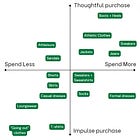Thanks for checking out Ten Dollar Latte! I’m not a financial advisor, just a 27-year-old trying to afford life in NYC. I write about how I spend my money while enjoying a $10 latte. Subscribe for free!
I had a revelation the other day. I was eating lunch, sitting on my couch, watching YouTube in the background, when I came across this video from one of my favorite personal finance Youtubers, Zoe Pritchard, where she asks why we strive to spend $0.
“Would I be a happier person if I actually spent $0?”
Spending habits fall on a spectrum for people, erring towards frugality or impulsive spending. Previously, I’ve been very frugal, and then, I actually moved towards the opposite end of the spectrum, towards overspending. But this year, due to a combination of reflecting heavily on my spending and a variable income, I shifted back towards being too frugal. The categorization is based on total spending, but also based on thoughts towards spending—did I feel good about those purchases, even if it’s the same purchases I made at this time three years ago?
That question stuck with me because, even as I justify different expenses, I strive to spend the least amount possible—and for what?
Each month, I go through my spending from the previous month, and each month, I feel guilty about the amount I’ve spent, even when I go through each category and know it’s mostly things I need—groceries, rent, laundry—or thoughtful purchases I’ve wanted for a while—new running clothes, tickets to a show, a night out with friends—and I don’t truly regret (most of) the purchases, but I feel the overall spending is too high. I still feel some guilt for what I’ve spent, and feel the need to justify each purchase. Each month, when it’s an all-time or recent lowest spend month, I celebrate in my Substack post.
Sure, it’s a spectrum of guilt. I feel worse when I’ve spent money on something frivolous or something I regret—clothes that don’t fit where I’ve missed the return window—compared to a purchase I’m happy with—new sneakers I’ve already worn fifteen times—but regardless, I still feel bad about having any money added to my spending, as if the goal was to spend $0 through the whole month.
I’ve been curious about doing a no-spend week or month for a while now: a whole week or month off from any discretionary spending. I’ve seen so many others do it, and I’m always curious to see how it would impact my overall monthly budget. If I did a no-spend week, how far would my discretionary spending fall that month?
My lowest spend month so far this year was May, when I spent $1,157.61 in discretionary spending (outside of rent). Would I be satisfied with $1,200? $1,000? $800? Would I ever consider the spending to be too low, or is the floor $0?
Every time I think about doing it, when I look ahead to the next few weeks, there’s always some event coming up I know I’ll spend money at (an event I want to attend!), and I push the idea to the back of my mind, to be reconsidered for a future week. And I feel a little more guilty, thinking it’s something I should do. But why?
Why do I feel this urge to spend $0?
I think it comes from a scarcity mindset about money, plus a little bit of competitive nature in me. The same part of me that wants to win a board game or race wants to get the best deal, and ultimately, the best deal is $0.
Even for the richest among us, money is a finite thing. You can earn more, sure, but that’s in the future, and the money you have currently is finite. At least, that’s how I’ve seen it. But I’m trying to challenge myself—what’s the point of having money if not to spend it? Security, but how much is too much and outweighs the benefits of spending money on things that make you happy? I’m also trying to remind myself: there will be more money in the future. I don’t have the maximum amount of money I’ll ever have.
I’m working on changing my perspective to evaluate my spending each month not by how much I spent, but how “worth it” the spending was. Did I buy things I used and enjoyed? Did I spend my money on things I value and make me a better person? Did I spend my money on things that made me happy? And that’s what I’ll be reflecting on each month now in my monthly resets instead of focusing on how little I spent compared to the previous month.
I might still try some no-spend type challenges, but only if there’s a purpose outside of spending $0. Maybe I’ll try a no-spend grocery challenge to try to use up what’s in my pantry and freezer and create less waste. Maybe I’ll try a no-spend clothing challenge with the goal of creating 10 new outfits with clothes I already own. Maybe I’ll try a no-spend challenge on eating food out to see if I can eat healthier and be more creative in the kitchen. But I won’t do a strict no-spend challenge for frugality for frugality’s sake.
Where do you fall on the frugality/overspending spectrum? Where do you want to be? Let me know in the comments!
I post weekly with personal finance & lifestyle tips, plus the Making it in NYC series and my monthly resets. Subscribe so you don’t miss it!
Want to be featured in a future Making it in NYC edition? Submit the form here or send me a DM on Substack.










As someone who has always enjoyed shopping, browsing, thrifting as entertainment, even if it it’s just for a cute notepad or a future gift for someone, the best thing I did for myself when I moved to NYC 20 years ago was to put a full month-long moratorium on all discretionary spending. It was crazy hard, but it broke the cycle and when I started shopping as entertainment again, I was much more able and content to window shop. And being older than you, I’ll put in my thoughts on the point of tightening up the discretionary spending if you can do it comfortably: compound interest. When time is on your side, even an extra $25 a month invested from your Roth will make a difference to future you. Not just the future you who is retired, but the future you who starts to have panic attacks 10 years before retirement. And by you I mean all of us.
I forget where I heard the term “financial anorexia” where I was over controlling my spending to feel like I had any control in life. I think it ended up hurting my relationships and now that I’m feeling more balanced I don’t want to cry when an unexpected expense comes up. Would love to read more about extreme frugality and mental health 🤔